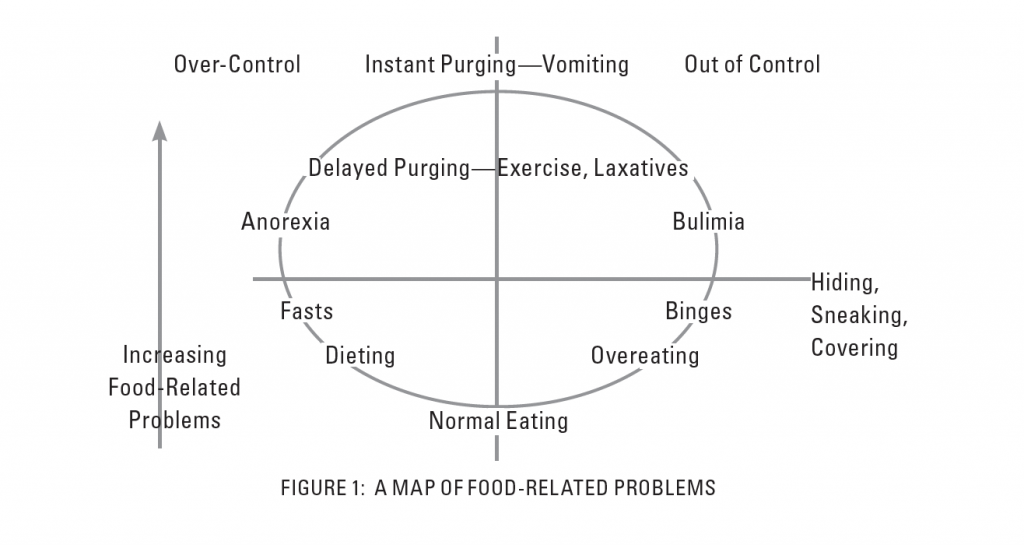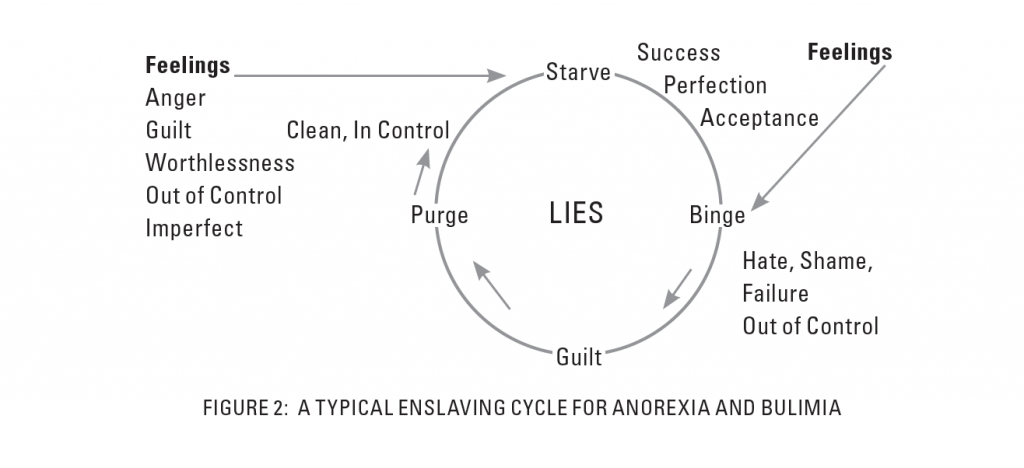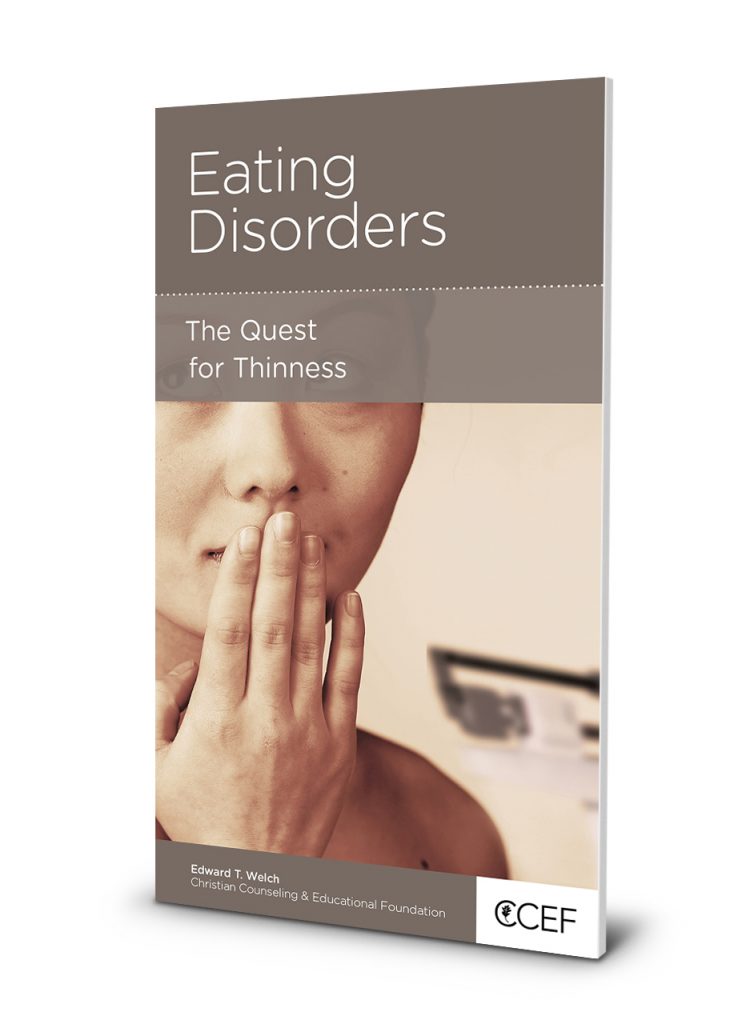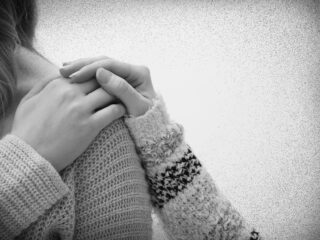Do you ever wish that you could just forget about food? What started as an innocent diet has turned into a monster. You eat too little. You eat too much. You restrict. You binge. It’s getting harder to cover up what you are doing. At first you tried exercise, then vomiting, then laxatives. Maybe you tried cutting too. Who would have thought that food—or the fear of it—would become the center of your life? Heroin, cocaine, and other street drugs lead to addictions. But food?
For you food is no longer . . . just food.
You know, of course, that you are not alone; many people struggle with eating disorders. It’s easy to see why. Advertisers sell their products using only one slim body type; movies show impossibly thin, surgically enhanced heroes and heroines; high-profile athletes have body fat percentages that can only be maintained with round-the-clock workouts; food is everywhere; and more than half the U.S. is on a diet. In some countries food is nutrition. Here food is nutrition, but it also means beauty, control, comfort, guilt, shame, love, and loathing.
Food Problems Start Small
You began life with normal eating habits: You ate when you were hungry and didn’t eat when you were full. But in a weight-conscious world, where food is used for comfort, you take small steps and “normal” gradually disappears. You want to be thin, so you become more serious about dieting. You like how food makes you feel, so you overeat and binge. Those who are close to you start noticing that food is becoming your obsession. You don’t see it because your obsession has tricked you into thinking you are doing better than ever. But the truth is that your struggles with food have gained momentum, and you have become anorexic, bulimic, or both.
What Is Anorexia?
Anorexia is all about not eating. It is an all-consuming fear of fat that leads you to starve yourself. Your fear might also lead you to try constant exercising, vomiting, and/or taking laxatives. What happens when these things don’t make you feel any better? Your next step might be another form of self-punishment such as cutting. When others try to help you, it’s easy for you to make them your enemy. You don’t want anyone standing between you and what you believe you need.
What Is Bulimia?
Bulimia is all about overeating. A lot of food eaten secretly and rapidly is its trademark. In contrast to anorexia’s control, bulimia is impulsive and out of control. Anorexia wants control, and seems to invite pain. Bulimia feels out of control, and wants comfort and relief. The two seem like complete opposites, but eventually, as your struggles with eating continue, they might look almost the same. If you start as an anorexic, sooner or later you might use the same weight-loss strategies as someone with bulimia. If you are bulimic, you might also use the anorexic devices of self-punishment and food restriction to make up for a binge.

How Did You Get Stuck?
How did you get into this cycle? Most people enter this cycle as a way of dealing with troubling, unwanted feelings—anger, pain, loneliness, guilt, self-loathing, and so on. Without knowing what to do with your emotions, you starve them by restricting food or comfort them by binging on food. You might feel a little better temporarily, but at some point you have to eat again, or purge what you have eaten. So you break one of your many food laws. Then you feel horrible again. So you punish yourself by starving your feelings or soothing them with food, and the cycle continues. Like a hamster on a rotating wheel, you keep running, even though you aren’t getting anywhere. You have a sense that there is no way out, but you distract yourself by binging, purging, or restricting. If you stop running, the hopelessness catches up to you, so you keep going, afraid to stop and afraid to think about the future. Without noticing how it happened, you’ve become a slave to your own food rules.

If this comes close to describing your life, don’t let hopelessness win. There is a way to break out of this cycle. It starts with you being open to the possibility that deep-down your problem is spiritual.
There is a way out: “by faith,” “through the Spirit,” and “faith expressing itself through love.” It is not rule keeping that saves you; it is your faith in Jesus that makes you clean, holy, and right (Romans 1:17; 8:1).
Sound easy? It is. It’s rest rather than work. It’s trust in another rather than independence. But, as you probably know, trust might be the last thing you want to do. Your quest for independence is one reason you dabbled in eating problems. You know that trust means giving up your own religion where food is at the center, and you are not likely to give that up easily. The only way you could trust God is to be absolutely certain that he is trustworthy. And he is.
How do you know that? Find out for yourself by looking at what God did when he came to earth as a man. Pick up a Bible, and read a little bit every day from the Gospel of John. Underline everything you read that shows you how trustworthy Jesus is. Notice especially how he treated people; think about why he died, and what his resurrection means for you. Jesus gave up his life for you. You can trust him with your life today. You can give up your food rules and follow him. You can “cast all your anxiety on him because he cares for you” (1 Peter 5:7).
Excerpted from Eating Disorders: The Quest for Thinness by Edward T. Welch. ©2008 by Christian Counseling & Educational Foundation.
Learn more about practical strategies for overcoming your struggles with food in Eating Disorders: The Quest for Thinness by Edward T. Welch. Click here to download a digital copy of this minibook for FREE.
EATING DISORDERS: THE QUEST FOR THINNESS
Edward T. Welch describes how easy it is, in a weight-conscious world that also uses food for comfort, to take the small steps that lead to a full-blown eating disorder. The way out is by understanding the thoughts and emotions that trigger your eating habits, and then taking the big step of trusting God, instead of your food rules and rituals.






